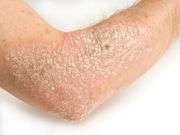(HealthDay)—For patients with psoriasis, treatment with anti-tumor necrosis factor (TNF) agents is associated with increased rates of antinuclear antibody (ANA) positivity, according to a letter to the editor published online Dec. 12 in the Journal of Dermatology.
Koichi Yanaba, M.D., Ph.D., from the Jikei University School of Medicine in Tokyo, and colleagues conducted a retrospective review of the clinical records of 66 Japanese patients with psoriasis treated with anti-TNF agents (infliximab or adalimumab) or ustekinumab. Patients treated with anti-TNF agents or ustekinumab were followed for a mean of 7.4 and 9.0 months, respectively.
The researchers found that during anti-TNF agent treatment there was an increase in ANA positivity in psoriasis patients from 48 to 69 percent (P = 0.038) at a dilution of 1:40; from 21 to 40 percent (P = 0.045) at a dilution of 1:80; and from 13 to 25 percent (P = 0.117) at a dilution of 1:160. At these three cut-off dilutions, ANA positivity was not significantly changed by ustekinumab. There was no significant difference in the 75 percent reduction of Psoriasis Area and Severity Index score response rates for psoriasis patients whose ANA became positive during anti-TNF agent treatment and those whose ANA did not change.
"Although this study showed that ANA development appeared not to affect the efficacy of anti-TNF agents, future studies should examine the longitudinal changes in ANA titers and efficacy for longer observation periods," the authors write.
One author disclosed financial ties to the pharmaceutical industry.
More information:
Abstract
Full Text (subscription or payment may be required)
Copyright © 2015 HealthDay. All rights reserved.






















